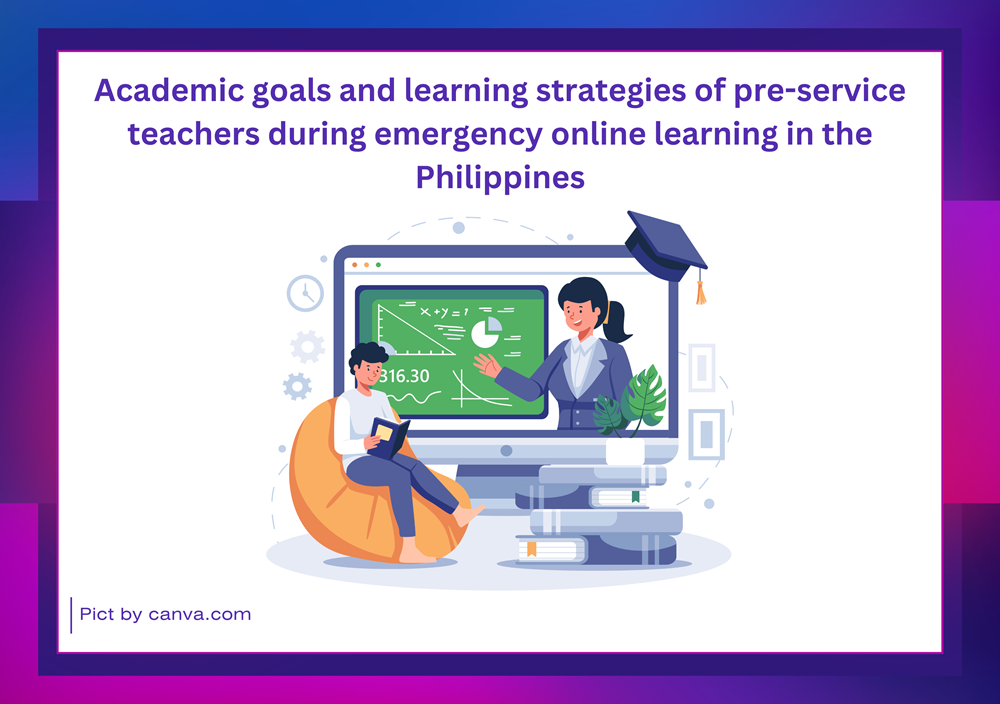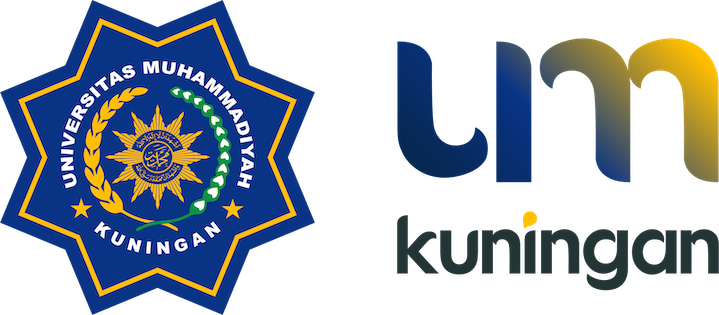Academic goals and learning strategies of pre-service teachers during emergency online learning in the Philippines

Downloads
Background: The COVID-19 pandemic has lasted an extended period, during which many students have reported being adversely affected by the escalating global crisis.
Objectives: This study examined the academic goals, learning barriers, facilitative strategies, and ways forward of pre-service teachers during emergency online learning.
Methods: This qualitative case study employed content analysis to examine data gathered through focus group discussions. To explore the implications of survey findings and gain deeper insights into students' perspectives on remote learning, the researchers conducted Focus Group Discussions (FGDs) with twelve purposively selected pre-service teachers via Google Meet. The discussion transcripts were analyzed to construct a compelling narrative, supported by literature and prior research, to explain emerging themes.
Results: Among the twelve participants, ten reported experiencing psychosocial stress, eight cited recurring technical issues, and seven mentioned financial constraints as significant learning barriers. Despite these challenges, the participants remained motivated to complete their coursework, viewing academic achievement as a stepping stone toward improving their socio-economic conditions. They employed various strategies, including scheduling, note-taking, goal-setting, optimistic thinking, parental scaffolding, and systematic planning, to adapt to online learning. To ensure credibility, the researchers used member checking, peer debriefing, and FGD and survey data triangulation.
Conclusions: These findings highlight the resilience and adaptability of pre-service teachers in navigating the challenges of emergency online learning, underscoring the need for supportive institutional policies and resources. Future research may consider comparing student experiences in public and private institutions or examining the long-term impact of emergency remote learning on teaching efficacy. Pedagogical and academic implications are further discussed.
Aboagye, E., Yawson, J. A., & Appiah, K. N. (2021). COVID-19 and E-learning: The challenges of students in tertiary institutions. Social Education Research, 2(1), 1-8. https://doi.org/10.37256/ser.212021422
Agrawal, S. (2021, February). A survey on recent applications of Cloud computing in education: Covid-19 perspective. In Journal of Physics: Conference Series (Vol. 1828, No. 1, p. 012076). IOP Publishing. https://doi.org/10.1088/1742-6596/1828/1/012076
Allo, M. D. G. (2020). Is the online learning good in the midst of Covid-19 Pandemic? The case of EFL learners. Jurnal Sinestesia, 10(1), 1-10. https://www.sinestesia.pustaka.my.id/journal/article/view/24
Al-Maskari, A., Al-Riyami, T., & Kunjumuhammed, S. K. (2021). Students academic and social concerns during COVID-19 pandemic. Education and Information Technologies, 27(1), 1–21. https://doi.org/10.1007/s10639-021-10592-2
Almusharraf, N. M., Costley, J., & Fanguy, M. (2020). The Effect of Postgraduate Students'interaction with Video Lectures on Collaborative Note-Taking. Journal Of Information Technology Education-Research, 19, 639-654. https://doi.org/10.28945/4581
August, R. A., & Dapkewicz, A. S. (2021). Benefit Finding in the COVID-19 Pandemic: College Students' Positive Coping Strategies. Journal of Positive School Psychology, 5(2), 73-86. https://doi.org/10.47602/jpsp.v5i2.245
Cakrawati, L. M. (2017). Students’ perceptions on the use of online learning platforms in EFL classroom. English Language Teaching and Technology Journal, 1(1), 22-30. https://doi.org/10.17509/elt%20tech.v1i1.9428
Dagdag, J. D., Sarmiento, C. S., & Ibale, J. C. (2017). Examining the factors of Licensure Examination for Teachers performance for program strategy enhancement. Asia Pacific Journal of Multidisciplinary Research, 5(4), 34-39.
Daniel, S. J. (2020). Education and the COVID-19 pandemic. Prospects, 49(1), 91-96. https://doi.org/10.1007/s11125-020-09464-3
De Negri, B., & Thomas, E. (2003). Making sense of focus group findings: a systematic participatory analysis approach. AED.
Duraku, Z. H., & Hoxha, L. (2020). The impact of COVID-19 on education and on the well-being of teachers, parents, and students: Challenges related to remote (online) learning and opportunities for advancing the quality of education. Manuscript submitted for publication]. Faculty of Philosophy, University of Prishtina, 17-45.
Fakhruddin, A. (2018). Using Google Meet in teaching speaking. Journal of English Language Learning (JELL), 2(2), 43-46. https://dx.doi.org/10.31949/jell.v2i2.2220
Ferri, F., Grifoni, P., & Guzzo, T. (2020). Online learning and emergency remote teaching: Opportunities and challenges in emergency situations. Societies, 10(4), 86. https://doi.org/10.3390/soc10040086
Gillett-Swan, J. (2017). The challenges of online learning: Supporting and engaging the isolated learner. Journal of Learning Design, 10(1), 20-30. https://doi.org/10.5204/jld.v9i3.293
Gollwitzer, P. M., Gawrilow, C., & Oettingen, G. (2010). The Power of Planning: Self-Control by Effective Goal-striving. In Self Control in Society, Mind, and Brain Oxford University Press. https://doi.org/10.1093/acprof:oso/9780195391381.003.0015
Graue, C. (2015). Qualitative Data Analysis. International Journal of Sales, Retailing & Marketing, 4(9).
Hawthorne, C. (2019). Black matters are spatial matters: Black geographies for the twenty‐first century. Geography Compass, 13(11), e12468. https://doi.org/10.1111/gec3.12468
Jena, P. K. (2020). Challenges and Opportunities created by Covid-19 for ODL: A case study of IGNOU. International Journal for Innovative Research in Multidisciplinary Field (IJIRMF), 6. https://ssrn.com/abstract=3691525
Kaplan, H., Hill, K., Lancaster, J., & Hurtado, A. M. (2000). A theory of human life history evolution: Diet, intelligence, and longevity. Evolutionary Anthropology: Issues, News, and Reviews: Issues, News, and Reviews, 9(4), 156-185. https://doi.org/10.1002/1520-6505(2000)9:4%3C156::AID-EVAN5%3E3.0.CO;2-7
Katheria, A., Rich, W., & Finer, N. (2013). Development of a strategic process using checklists to facilitate team preparation and improve communication during neonatal resuscitation. Resuscitation, 84(11), 1552-1557. https://doi.org/10.1016/j.resuscitation.2013.06.012
Ko, A., Pick, C. M., Kwon, J. Y., Barlev, M., Krems, J. A., Varnum, M. E. W., Neel, R., Peysha, M., Boonyasiriwat, W., Brandstätter, E., Crispim, A. C., Cruz, J. E., David, D., David, O. A., de Felipe, R. P., Fetvadjiev, V. H., Fischer, R., Galdi, S., Galindo, O., Kenrick, D. T. (2019). Family Matters: Rethinking the Psychology of Human Social Motivation. Perspectives on Psychological Science, 15(1), 173-201. https://doi.org/10.1177/1745691619872986
Krueger Jr, N., & Dickson, P. R. (1994). How believing in ourselves increases risk taking: Perceived self‐efficacy and opportunity recognition. Decision sciences, 25(3), 385-400. https://doi.org/10.1111/j.1540-5915.1994.tb01849.x
Kujur, S., Vinayagam, S. S., Awasthi, H. K., & Murthy, G. R. K. (2019). Constraints Faced by the Students in Use of Educational Technology for Learning. Communication Approaches, 37, 12. https://ajeeakola.in/pdf/Journal-Volume-37-2019.pdf#page=19
Lie, A. (2020). COVID-19 disruption and the widening digital divide. The Jakarta Post.
Liguori, E., & Winkler, C. (2020). From offline to online: Challenges and opportunities for entrepreneurship education following the COVID-19 pandemic. Entrepreneurship Education and Pedagogy, 3(4), 346-351. https://doi.org/10.1177/2515127420916738
Martin, F., & Parker, M. A. (2014). Use of synchronous virtual classrooms: Why, who, and how. MERLOT Journal of Online Learning and Teaching, 10(2), 192-210. https://jolt.merlot.org/vol10no2/martin_0614.pdf
Meine, L. E., Strömer, E., Schönfelder, S., Eckhardt, E. I., Bergmann, A. K., & Wessa, M. (2021). Look after yourself: students consistently showing high resilience engaged in more self-care and proved more resilient during the COVID-19 pandemic. Frontiers in psychiatry, 12, 784381. https://doi.org/10.3389/fpsyt.2021.784381
Mospan, N. (2023). Trends in emergency higher education digital transformation during the COVID-19 pandemic. Journal of University Teaching & Learning Practice, 20(1), 50-70. https://doi.org/10.53761/1.20.01.04
Mula, N. M., & Patigayon, C. R. (2022). Journey of academe survivors amidst educational turmoil in the time of COVID-19 pandemic. Jozac Academic Voice, 67-70. https://journals.jozacpublishers.com/jav/article/view/241
Nyumba, T., Wilson, K., Derrick, C. J., & Mukherjee, N. (2018). The use of focus group discussion methodology: Insights from two decades of application in conservation. Methods in Ecology and evolution, 9(1), 20-32. https://doi.org/10.1111/2041-210X.12860
O'Keefe, L., Rafferty, J., Gunder, A., & Vignare, K. (2020). Delivering High-Quality Instruction Online in Response to COVID-19: Faculty Playbook. Online Learning Consortium. https://eric.ed.gov/?id=ED605351
Piotrowski, M. (2010). What is an e-learning platform?. In Learning management system technologies and software solutions for online teaching: Tools and applications (pp. 20-36). IGI Global. https://doi.org/10.4018/978-1-61520-853-1.ch002
Prahanı, B. K., Amiruddin, M. Z. B., Suprapto, N., Deta, U. A., & Cheng, T. (2022). The trend of physics education research during COVID-19 pandemic. International Journal of Educational Methodology, 8(3), 517–533. https://doi.org/10.12973/ijem.8.3.517
Putri, S. A., & Mahmudah, F. N. (2021). Time management skills: Completion of student final project during the COVID-19 pandemic. JHSS (Journal of Humanities and Social Studies), 5(3), 232–236. https://doi.org/10.33751/jhss.v5i3.3992
Rashid, S., & Yadav, S. (2020). Impact of COVID-19 pandemic on higher education and research. Indian Journal of Human Development, 14(2), 340–343. https://doi.org/10.1177/0973703020946700
Realyvásquez-Vargas, A., Maldonado-Macías, A. A., Arredondo-Soto, K. C., Baez-Lopez, Y., Carrillo-Gutiérrez, T., & Hernández-Escobedo, G. (2020). The impact of environmental factors on academic performance of university students taking online classes during the COVID-19 Pandemic in Mexico. Sustainability, 12(21), 9194. https://doi.org/10.3390/su12219194
Redmond, P., Abawi, L. A., Brown, A., Henderson, R., & Heffernan, A. (2018). An online engagement framework for higher education. Online learning, 22(1), 183-204. https://doi.org/10.24059/olj.v22i1.1175
Ryan, R. M., & Deci, E. L. (2024). Self-determination theory. In Encyclopedia of Quality of Life and Well-Being Research (pp. 6229-6235). Cham: Springer International Publishing. https://doi.org/10.1007/978-3-031-17299-1_2630
Shin, M., & Hickey, K. (2020). Needs a little TLC: examining college students’ emergency remote teaching and learning experiences during COVID-19. Journal of Further and Higher Education, 45(7), 973–986. https://doi.org/10.1080/0309877X.2020.1847261
Sirén, C., & Kohtamäki, M. (2016). Stretching strategic learning to the limit: The interaction between strategic planning and learning. Journal of Business Research, 69(2), 653-663. https://doi.org/10.1016/j.jbusres.2015.08.035
Sun, S. Y. H. (2011). Online language teaching: The pedagogical challenges. Knowledge management & E-Learning, 3(3), 428-447. https://doi.org/10.34105/j.kmel.2011.03.030
Sutarto, S., Sari, D. P., & Fathurrochman, I. (2020). Teacher strategies in online learning to increase students' interest in learning during COVID-19 pandemic. Jurnal Konseling dan Pendidikan, 8(3), 129–137. https://doi.org/10.29210/147800
Toquero, C. M. D., Acebes, S. J. C., Melitante, J. B., & Tuble, N. T. (2021). Rainbows amid Downpours: University Students’ Goals in Learning English during Digital Experiments. REiLA : Journal of Research and Innovation in Language, 3(2), 87-95. https://doi.org/10.31849/reila.v3i2.6910
Uluöz, E. (2020). Opinions of the faculty of sport sciences students on the changes in education system during COVID-19 pandemic: A qualitative research. African Educational Research Journal, 8(3), 481–490. https://doi.org/10.30918/aerj.83.20.114
Wang, G., Zhang, Y., Zhao, J., Zhang, J., & Jiang, F. (2020). Mitigate the effects of home confinement on children during the COVID-19 outbreak. The Lancet, 395(10228), 945-947. https://doi.org/10.1016/S0140-6736(20)30547-X
Wankhade, P. P., Mankar, D. M., Kale, N. M., & Shambharkar, Y. B. (2017). Use of information communication technologies in the post graduate students. Indian Res. J. Ext. Edu, 17(2), 78-80. http://seea.org.in/ojs/index.php/irjee/article/view/1268/892
Yan, Z. (2020). Unprecedented pandemic, unprecedented shift, and unprecedented opportunity. Human Behavior and Emerging Technologies, 2(2), 110-112. https://doi.org/10.1002/hbe2.192
Yates, A., Starkey, L., Egerton, B., & Flueggen, F. (2021). High school students' experience of online learning during Covid-19: the influence of technology and pedagogy. Technology, Pedagogy and Education, 30(1), 59-73.
Copyright (c) 2025 Swen Joshryll Acebes, Jaizel Malitante, Nikki Tuble, Rowena Bongolto

This work is licensed under a Creative Commons Attribution-ShareAlike 4.0 International License.



